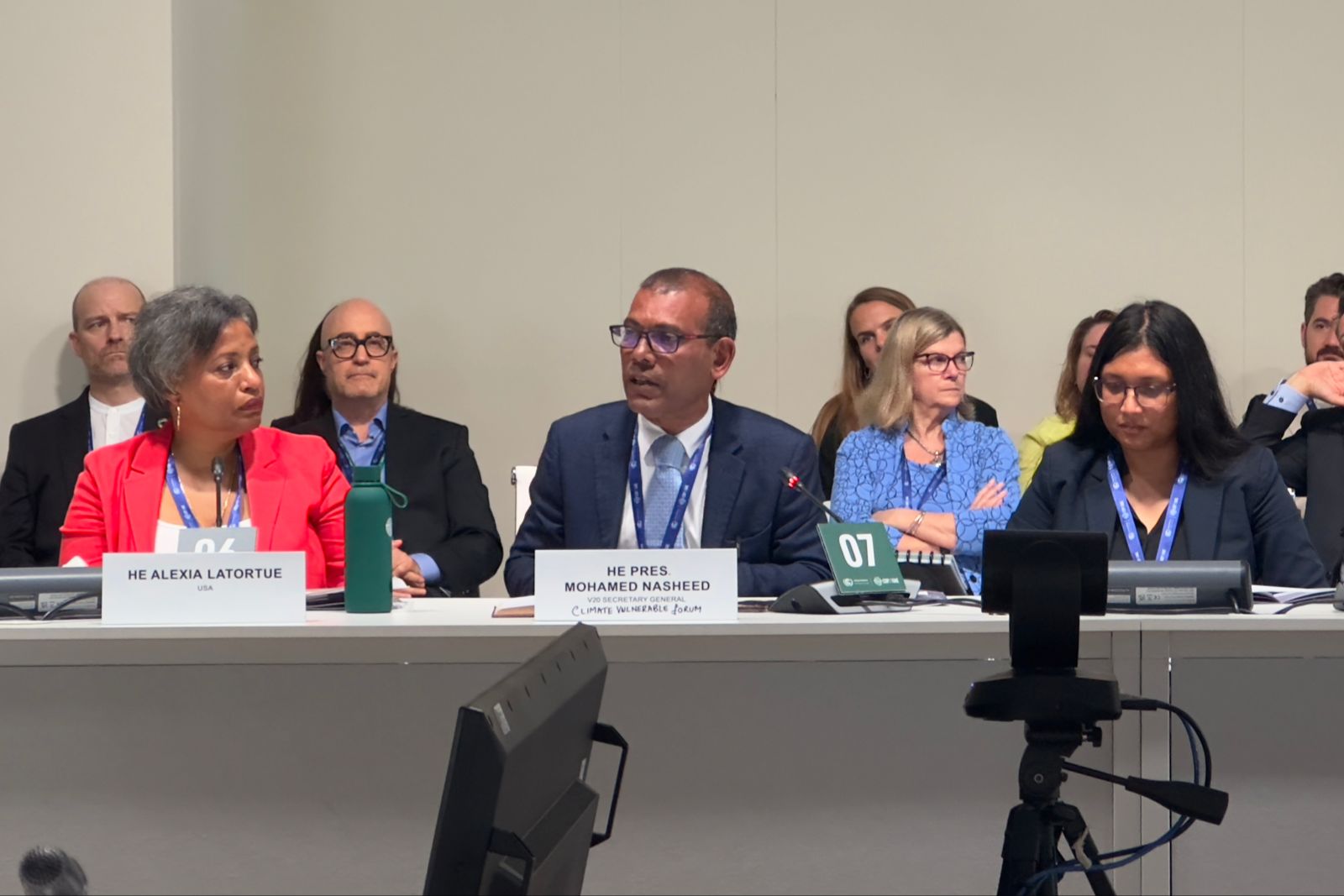Climate-vulnerable developing countries will require 10 trillion dollars of investment to meet clean energy and development goals, according to the incoming secretary-general of the Climate Vulnerable Forum (CVF), former Maldives president Mohamed Nasheed.
Nasheed, who will be leading a coalition of 68 of the most climate-vulnerable countries – comprising 1.74 billion people, including some of the world’s poorest – was speaking at a high-level finance event at COP28 in Dubai alongside Barbados Prime Minister Mia Mottley, who will be taking over as CVF president in early 2024.

“If you are asking the low emitting countries such as the CVF nations not to become big emitters, they must have a strategy for economic growth and livelihoods entirely driven through clean energy and clean technology,” Nasheed told the assembled delegates.
Making the point that rich countries have already used up the atmospheric space for 1.5 degrees, Nasheed said that climate justice demands that the big emitters provide the finance for the less developed countries to develop in a clear direction.
Multilateral development banks
“We need to move from billions to trillions in this conversation, and we need to ensure that CVF countries are not locked out of investment flows because of debt and the high cost of capital.” Several members of the CVF, including Ghana, Sri Lanka, and Bangladesh, have completed ‘climate prosperity plans’ outlining their investment needs to develop in a low-carbon way.
However, many of the CVF’s 68 member nations are considered high-risk and suffer a very high cost of capital. Many also have unsustainable sovereign debt burdens because of the high cost of debt and wealth destruction from losses and damages sustained due to climate change.
To attract large-scale funding, according to a concept note seen by the Alliance for Science, CVF countries are proposing the creation of a new asset class of bonds across several countries, de-risked via underwriting by multilateral development banks, which would be offered to sovereign wealth funds and other big investors. These would cover a broad spectrum of energy-related infrastructure and natural capital to enable the delivery of climate prosperity plans.
Members need urgent budgetary assistance
However, a major obstacle is the unsustainable debt crisis that is pushing many CVF countries to the edge of bankruptcy. President Nasheed reminded the meeting: “You cannot focus on climate strategies when people do not have enough to eat, and the country is unstable. The CVF countries have 500 billion dollars of debt due in the next few years. So instead of capital inflows, we see capital outflows, mostly to the high emitting parts of the world.”
In a first recognition of this, the World Bank has recently proposed a ‘debt pause’ that will enable climate-vulnerable countries to stop paying lenders in the aftermath of disasters and other climate-high-impact events. However, CVF finance ministers, who collaborate in the V20 framework under the Climate Vulnerable Forum, also say that many members need urgent budgetary assistance.
‘We cannot trade off poverty for climate stability’
Nasheed concluded: “I can assure you today that none of the 68 CVF members want high-carbon development. But development itself is non-negotiable. We cannot trade off poverty for climate stability. Clean development will require the world to pay serious attention to the investment needs of the climate vulnerables. We cannot have 1.7 billion people in this room, but the voices of the vulnerables must always be heard.”
Finance has been a major issue at the COP28 climate summit in Dubai. The Loss and Damage Fund, a key demand of climate-vulnerable countries, was successfully launched on the first day and has attracted pledges of around 0.6 billion dollars from high-emitting countries. However, much more will be needed if the countries at greatest risk of climate impacts are to be compensated for the damages they suffer – both from slow-onset events like rising sea levels and rapid events like floods and droughts.
Although December 4 was dubbed ‘Finance Day’ by the United Arab Emirates presidency of COP28, much work remains to be done before either loss and damage or clean energy investment and adaptation financing even approaches sufficient levels for developing nations.
_______________________________________________________________________________________________
Mark Lynas is a climate change author and campaigner. He is an advisor to the former President of the Maldives, Mohamed Nasheed. He is the research and climate lead with the Alliance for Science, where he has co-authored peer-reviewed papers on vaccines, climate, and GMOs focusing on scientific consensus and misinformation.
